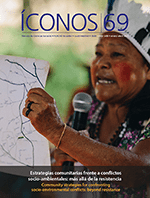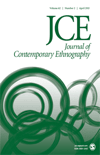
Gazeta de Antropologia
Scope & Guideline
Connecting Scholars, Cultures, and Ideas.
Introduction
Aims and Scopes
- Feminist Anthropology and Gender Studies:
The journal focuses on feminist perspectives within anthropology, exploring issues related to gender, sexuality, and power dynamics, particularly in the context of marginalized communities and social stigmas. - Social Vulnerability and Rights Defense:
Research often addresses themes of social vulnerability, particularly regarding marginalized groups, including sex workers and immigrants, emphasizing rights defense and social justice. - Ethnographic Methodologies:
The journal promotes the use of ethnographic methods for deep cultural understanding, analyzing lived experiences, and documenting social practices within various communities. - Cultural Dynamics and Tradition:
It examines the interplay between tradition and modernity, investigating how cultural practices evolve and adapt in contemporary societies. - Interdisciplinary Approaches:
The journal incorporates insights from sociology, psychology, and other social sciences, fostering a comprehensive understanding of complex social phenomena.
Trending and Emerging
- Sex Work and Agency:
There is a notable increase in research addressing sex work, focusing on the agency of workers, stigma, and the socio-economic dynamics that shape their experiences. This theme is crucial for understanding broader social justice issues. - Migration and Transnational Dynamics:
Recent publications emphasize the complexities of migration, exploring the transnational experiences of communities and the social constructs surrounding foreign populations, which is increasingly relevant in today’s globalized context. - Mental Health and Social Justice:
Emerging articles explore the intersections of mental health, trauma, and social justice, particularly in relation to marginalized groups, reflecting a growing recognition of the importance of mental health in anthropological discourse. - Cultural Resistance and Activism:
Research focusing on cultural resistance, particularly among marginalized groups, is gaining traction, highlighting the role of culture in social movements and activism. - Intersectionality in Social Issues:
There is a rising trend towards examining social issues through an intersectional lens, integrating perspectives on race, gender, class, and sexuality to provide a more nuanced understanding of social dynamics.
Declining or Waning
- Traditional Cultural Studies:
While still present, research focusing solely on traditional cultural practices without contemporary contextualization has seen a decline, as there is a growing emphasis on applying traditional studies to current socio-political issues. - Generalized Theoretical Discourses:
The journal previously included a wider range of theoretical discussions that are now less frequent, indicating a shift towards more applied and empirical research. - Historical Analysis without Contemporary Relevance:
Historical analyses that do not connect to current social issues or debates are becoming less common, as the journal prioritizes research with immediate relevance to contemporary societal challenges.
Similar Journals

Iconos
Unlocking Knowledge: Open Access to Transformative ResearchIconos is a distinguished academic journal published by FAC LATINOAMERICANA CIENCIAS SOCIALES-FLACSO in Ecuador, with an ISSN of 1390-1249 and an E-ISSN of 1390-8065. Since its inception in 1997, Iconos has proudly maintained an open-access policy, promoting accessibility and dissemination of critical research across various disciplines. With a strong focus on Anthropology, Gender Studies, and Social Sciences, this journal has achieved a commendable standing, being categorized in the Q2 quartile in 2023 across multiple categories in these fields. Notably, it ranks #199 in Anthropology and #91 in Gender Studies, placing it in the upper percentiles of academic publishing. The journal aims to foster interdisciplinary dialogue and to illuminate socio-cultural dynamics through rigorous scholarship. With its commitment to quality, research diversity, and social relevance, Iconos serves as an essential resource for researchers, professionals, and students alike, seeking to engage with contemporary social issues from a Latin American perspective.

AMERICAN ETHNOLOGIST
Pioneering Research in Anthropology and BeyondAMERICAN ETHNOLOGIST, published by Wiley, stands as a prominent platform in the field of anthropology, with a distinguished reputation underscored by its Q1 ranking in the 2023 Category Quartiles and a notable position in the 79th percentile among its peers. With its foundation dating back to 1974 and set to continue until 2024, this journal serves as a vital resource for researchers, practitioners, and students devoted to exploring cultural dynamics and social practices across diverse communities. The journal is characterized by its commitment to advancing theoretical discussions and empirical scholarship in ethnology and related disciplines. Targeted contributions include in-depth studies, critical reviews, and innovative methodologies that engage with pressing cultural issues. Although it does not offer Open Access, the journal’s rigorous peer-review process and high-impact articles ensure the dissemination of valuable insights, enhancing scholarly engagement and professional discourse. Its ISSN is 0094-0496 and E-ISSN is 1548-1425, emphasizing its dual format accessibility, which facilitates wider readership within the anthropology community.

Lares-Quadrimestrale di Studi Demoetnoantropologici
Unraveling Cultural Practices Through Scholarly InquiryLares-Quadrimestrale di Studi Demoetnoantropologici is a prominent scholarly journal dedicated to the fields of demoethnoanthropology, exploring the intersections of cultural practices, traditions, and social dynamics. Published by CASA EDITRICE LEO S OLSCHKI, this esteemed journal provides an academic platform for researchers and practitioners to disseminate original research findings and critical reviews, delving into ethnographic studies and community-based inquiries. With an ISSN of 0023-8503 and an E-ISSN of 2036-511X, Lares is recognized for its commitment to scholarly excellence and its contribution to advancing knowledge within its field. Although it currently categorizes as non-open access, the journal remains highly regarded among academics, ensuring the widespread dissemination of significant research. The journal's base in beautiful Florence, Italy, enhances its cultural richness and appeal, making it a notable reference point for scholars dedicated to the study of human cultures and social systems.

DIALECTICAL ANTHROPOLOGY
Engaging with the Pulse of Social DynamicsDIALECTICAL ANTHROPOLOGY, published by SPRINGER, is a prestigious journal within the field of anthropology, recognized for its substantial contributions to dialectical and critical theory in social research. Since its inception in 1975, the journal has carved a niche by exploring the intersections of culture, society, and politics, making it an essential resource for scholars and practitioners. With an impact factor that places it in the Q2 category for both anthropology and arts and humanities, and significant rankings in sociology and political science, it reflects a solid scholarly reputation. The journal operates on a subscription basis, allowing for a wide dissemination of rigorous academic research without open access. With ISSN 0304-4092 and E-ISSN 1573-0786, DIALECTICAL ANTHROPOLOGY serves as a crucial platform for fostering dialogue and advancing knowledge in contemporary anthropology and related disciplines. As a researcher, professional, or student, engaging with the insights presented in this journal will deepen your understanding of the dynamic interplay between structural and agency-oriented perspectives in social contexts.

Social Analysis
Unpacking the Dynamics of Human ExperienceSocial Analysis, an esteemed academic journal published by BERGHAHN JOURNALS, is at the forefront of interdisciplinary research, focusing on the dynamic intersections of anthropology, cultural studies, sociology, and the arts and humanities. Since its inception in 2002 and having transitioned to an Open Access model in 2020, the journal ensures that critical social research is widely accessible to scholars and the public alike. With an impressive Q1 ranking in Anthropology and cultural studies and holding a notable Q2 in Sociology and Political Science, it garners attention from a large academic audience, as evidenced by its high Scopus rankings: 10th in general arts and humanities and 153rd in cultural studies. This signifies its influential role in shaping contemporary discourse and providing a platform for innovative ideas and methodologies in understanding social phenomena. Based in Brooklyn, NY, the journal is dedicated to fostering scholarly dialogue and advancing the field, making it an essential resource for researchers, professionals, and students eager to engage with and contribute to the field of social analysis.

Anthropology in Action-Journal for Applied Anthropology in Policy and Practice
Bridging Culture and Policy for Real-World ImpactAnthropology in Action - Journal for Applied Anthropology in Policy and Practice, published by BERGHAHN JOURNALS, stands as a pivotal resource within the field of applied anthropology, addressing vital issues at the intersection of cultural insights and policy development. With an impressive Q1 ranking in Anthropology and a noteworthy position in the Scopus Ranks (Rank #70 of 502), this journal has solidified its influence as a premier platform for scholars and practitioners seeking to engage with contemporary societal challenges through a rigorous anthropological lens. Since becoming Open Access in 2018, the journal has enhanced accessibility to its rich array of scholarly articles, making critical research findings available to a broader audience. Covering a spectrum of topics from community practice to inform policy-making, Anthropology in Action aims to foster cross-disciplinary dialogue and promote the practical application of anthropological insights for real-world change. Whether you are a researcher, policymaker, or student, this journal serves as an essential navigational tool in the evolving landscape of applied anthropology.

Afghanistan
Unveiling the Richness of Afghan History and CultureAfghanistan, published by Edinburgh University Press, is an insightful academic journal dedicated to exploring the rich and multifaceted dimensions of Afghan culture, history, and socio-political dynamics. This journal, which has been publishing since 2018, serves as a crucial platform for interdisciplinary discourse, contributing significantly to fields such as anthropology, archaeology, classics, history, literature, and religious studies. With notable rankings within the Scopus indices, including a Q2 ranking in Literature and Literary Theory, it highlights the importance of Afghan studies within the global academic landscape. Although it operates without an open access model, the journal maintains rigorous peer-review standards, aiming to foster scholarly dialogue and promote a greater understanding of Afghanistan's unique cultural heritage and contemporary issues. Researchers, professionals, and students alike will find valuable insights within its pages, allowing them to engage critically with the complexities of Afghan society and its contributions to broader human narratives.

Genre Sexualite & Societe
Bridging Gaps in Gender and Sexuality ResearchGenre Sexualite & Societe is a renowned open-access journal published by ECOLE HAUTES ETUDES & SCIENCES SOC-EHESS, COLL FRANCE, focusing on the complex dynamics of gender, sexuality, and society. Since its inception in 2009, this journal has established itself as a vital resource for interdisciplinary research, fostering scholarly discussion among researchers, professionals, and students in the fields of sociology, gender studies, and sexualities. With an ISSN of 2104-3736 and a commitment to providing freely accessible content, Genre Sexualite & Societe aims to bridge gaps in knowledge and promote diverse perspectives on contemporary social issues. Based in Paris, France, the journal encourages the submission of innovative research which explores the intersections of identity, power structures, and social practices, underscoring its significance in the academic community.

Departures in Critical Qualitative Research
Illuminating the Complexities of Qualitative AnalysisDepartures in Critical Qualitative Research, published by University of California Press, is an influential journal dedicated to advancing knowledge within the realms of Communication and Linguistics and Language. With its commitment to exploring the complexities and nuances of qualitative research, this journal has quickly established itself as a vital resource for scholars and professionals alike. Although it currently resides in the fourth quartile in Communication and the third quartile in Linguistics, its notable Scopus rankings, including a 64th percentile in Language and Linguistics, highlight its growing significance in the academic discourse. Covering a converged period from 2019 until 2024, the journal seeks to foster innovative and critical perspectives on qualitative methodologies, offering invaluable insights that address contemporary social issues. Access to its content is available to a wide audience, contributing to the journal's reputation as a beacon for those engaged in critical qualitative research.

JOURNAL OF CONTEMPORARY ETHNOGRAPHY
Pioneering Ethnographic Research for a Changing SocietyJOURNAL OF CONTEMPORARY ETHNOGRAPHY, an esteemed publication by SAGE PUBLICATIONS INC, is a leading journal that delves into the rich and dynamic field of ethnographic research. With a strong focus on anthropology, linguistics, sociology, and urban studies, this journal offers insights that are crucial for understanding contemporary social dynamics and cultural interactions. Established in 1972 and publishing continuously through significant eras of social change, the journal boasts an impressive Q1 ranking across multiple categories in the 2023 Scimago metrics, reflecting its prominence in the academic community. The journal holds a significant position, ranked #118 in Language and Linguistics and #67 in Anthropology within Scopus, showcasing its relevance and impact on both theory and practice. With no open access option, the journal dedicates itself to high-quality, peer-reviewed research that informs scholars and practitioners alike, underlining its importance as a reference point for advancing discussions in contemporary ethnography.